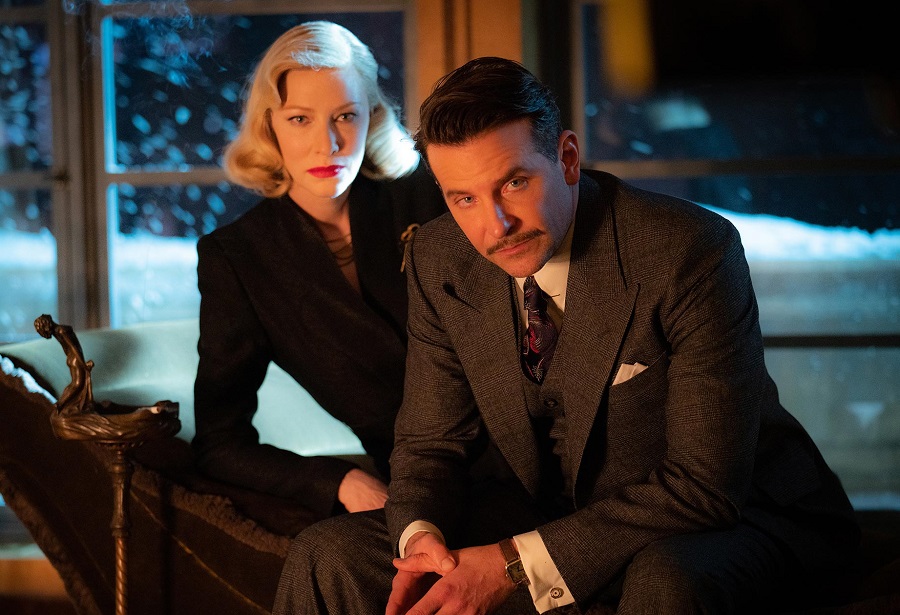

Sumptuously photographed and featuring a to-die-for cast who are clearly relishing the opportunity to play in director Guillermo del Toro's hyper-fantastical sandbox, Nightmare Alley is going to prove to be a good time at the movies for a lot of people. Just how good largely depends on how big of a film noir fan you are, as this remake of the 1947 cult noir classic (that was itself based on a 1946 novel) doesn't so much reinterpret the genre for modern times as it does meticulously recreate it, right down to the overly stark shadows and vignette transitions. As a result, the movie feels more successful as a strict genre exercise than as a story you're meant to get emotionally swept up into, which could limit the film's overall impact for some. Yet this is also a far more focused affair than, say, his narratively messy haunted house film, Crimson Peak. That, combined with the master craftsmanship on display, puts Nightmare Alley, which opens Dec. 17, into "good enough" territory for me. Your mileage may vary, and, again, it might depend on just how nuts you are for noir.
Bradley Cooper stars as Stanton Carlisle, a drifter with a dark past who winds up taking on odd jobs with a traveling carnival in the late 30s. For a while, it seems like Stanton is going to be less of a character and more of a guide through this bizarre and immoral world. A man with bigger ambitions than loading tents onto trucks, Stanton befriends most of the crew, including carnie manager Clem (Willem Dafoe), an electricity-channeling ingenue named Molly (Rooney Mara), and, most importantly, two con-artist mentalists (David Strathairn and Toni Collette) who are a couple both on and off the stage. Everyone is great to fun to watch playing these lively and colorful characters, especially Dafoe, who dives in with gusto as he explains how you go about turning a man running low on hope into a beastlike carnival geek (a bottom-rung sideshow act that culminates in the geek eating a live chicken).
Slowly but surely, Stanton begins blossoming into a more well-defined character, and you start to get the sense that he only values his co-workers as much as he can use them. He first begins to learn the tricks of the mentalist trade by asking Strathairn's character politely but later masters the gift by more employing more dubious methods. Before long, his aspirations outgrow the carnival, and, two years after joining the troupe, he whisks Molly away to the big city where he gains some notoriety as a man who can commune with the dead. At that point, Nightmare Alley leaves the carnival world behind for its more traditionally noirish second act. As Stanton's fame grows, his marks become more prominent, and he eventually becomes entangled with a mysterious psychiatrist (a fierce and expectedly radiant Cate Blanchett). Using her wealth of collected secrets, the two team up to pull increasingly more profitable scams on some of the city's most elite — but dangerous — citizens. As you might guess, things end up not going so smoothly in that regard, and Stanton's mounting sins eventually catch up with him.
I liked the film's first half better, but, then again, I'm a sucker for early-to-mid-20th-century-set carnival stories. (Dramatized freak shows haven't had it this good since HBO blessed us with two seasons of Carnivàle.) And though there are no supernatural shenanigans in this film, del Toro does get to play around with the type of gruesome imagery that he made his name on. In the second half, all those fun supporting characters are left behind as Nightmare Alley turns into more of a two-hander focused almost entirely on Cooper and Blanchett. (Mara is still around, although her character is never particularly well-defined, and Richard Jenkins also shows up in a part he's too good for.) Blanchett is obviously just blistering every moment she's on screen, burning scenes to the ground around her, while Cooper struggles to keep up. The plot could be described as "twisty" but never really goes anywhere surprising. Character motivations are primal but also sort of basic. Noir stories have their own set of rules, and Nightmare Alley sticks to them with rigorous obedience. That continues all the way through to the film's final scene, which is fitting but also completely expected.
By the end, I was missing the carnival folk who had populated the film's opening half. (Also among that crew is del Toro mainstay Ron Perlman.) There's a great scene where the always-welcome Jim Beaver shows up as a local sheriff planning to shut down the carnival, but Cooper's Stanton springs into action, using tricks of "psychic" trade to defuse the situation. The film's second half relies more on you caring what happens to Stanton and Molly, which, honestly, I really didn't. They make for great props in a slavish recreation of a genre that has since splintered into a million different sub-genres (pulp noir, tech noir, etc), but they're not the most interesting characters del Toro has ever brought to screen. I found 2017's Best Picture-winning The Shape of Water a tad overrated, but there's no doubt that it's much easier to invest emotionally in Sally Hawkins' lonely janitor in that film than it is to get worked up over Cooper's often blank-faced con man here. Though, again, moral ambiguity is one of film noir's foundational themes, and there's no doubting that what del Toro has made is a gorgeous and committed observance of the genre.











